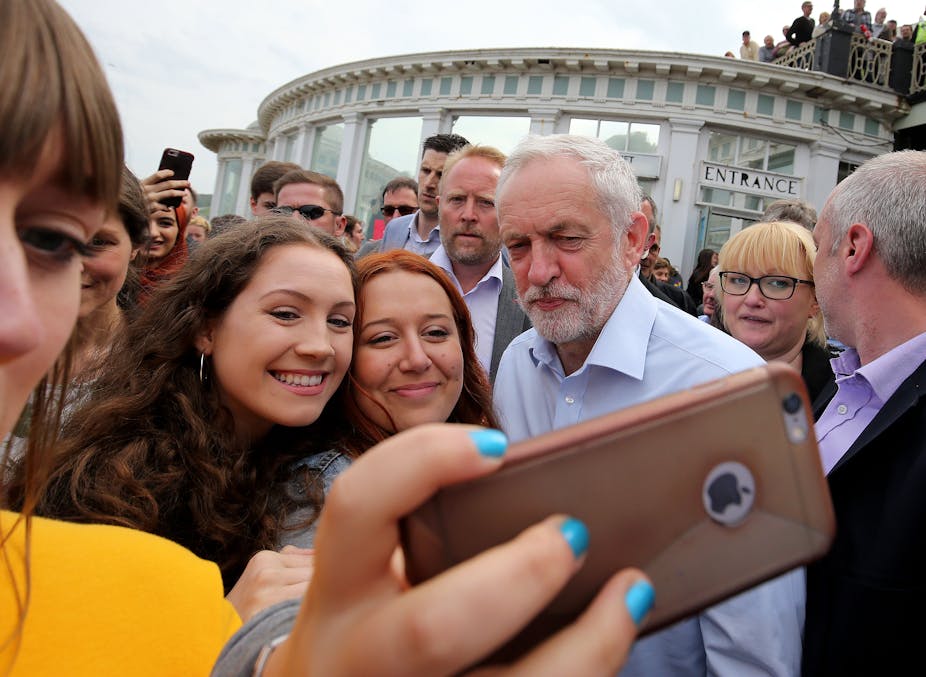At the start of the 2017 election campaign, there were indications that turnout among young voters might rise – and happily, they proved to be correct. On the day, 64% of 18- to 24-year-olds on the electoral roll turned out to vote, a 21-point increase from the 2015 general election. This was predominantly to Labour’s advantage, with 62% of young people who voted opting for the party of Jeremy Corbyn.
Leaving aside any judgements about Corbyn, his manifesto or his party, these numbers are unambiguously a cause for celebration. Britain’s young people have proven they are neither apathetic nor lazy, two stereotypes long used to dismiss them despite evidence to the contrary. Research shows that younger voters’ previous non-participation was largely a conscious opt-out; they felt that Westminster politics was largely irrelevant to their lives, the province of self-serving and elitist politicians whose policies simply weren’t designed with them in mind.
The 2017 election has for now dispelled the myth of the uncaring young non-voter. But depressingly, one set of paternalistic assumptions seems to have been replaced by another: instead of tuned-out layabouts, the young are now being dismissed as misguided and naive.
No sooner was the exit poll released than this new misrepresentation began to circulate. Conservative MP Margot James wrote that young people had been too easily tempted by Labour’s promised “handouts”; Sir Alan Sugar put it even more bluntly, saying the young don’t have enough life experience to cast informed votes: “I’m not sure if they really knew what they were voting for.”
Young people are sadly accustomed to such elitist views, these perspectives ignore what motivated this generation to turn out in considerably higher numbers in 2017 than has been the case in recent elections.
Making politics matter
A great many young people are deeply concerned about their future. They struggle to control the direction of their lives, and many of them face more difficult socioeconomic conditions than their parents did: housing is extremely expensive, employment is often insecure, and state support is being withdrawn and transferred to older cohorts.
Frustratingly, some of these problems are byproducts of successive governments’ electoral politicking. The Institute for Public Policy argues that government spending allocations have been directed to reward groups who reliably vote in numbers while ignoring groups who don’t.
Unsurprising then that young people might want to vote for a party which seems to understand their experiences, and which proposes to improve their financial outlook by abolishing university tuition fees, increasing wages, and improving employment protections.
Young people are also unhappy that the political establishment disdains direct engagement with voters in favour of coordinated messages from centralised party hierarchies. So again, small wonder that they were more inspired by Labour’s campaign, a far more direct and low-level strategy than the Conservatives’ slogan-dependent strategy, which kept Theresa May away from the public as much as possible.
Labour’s digitally savvy party activists were able to target young people through social media in ways that the Conservative party couldn’t, using positive messages that contrasted favourably with the Conservatives’ thoroughly negative lines against Corbyn.
Something else also happened during the campaign, and not just thanks to Labour: young people’s issues for once enjoyed genuine prominence. All major parties bar the Conservatives and UKIP promised to lower the voting age to 16. The Labour and Green manifestos made pledges that were specifically aimed at improving young people’s circumstances, while the Liberal Democrats created a specific Young People’s Manifesto. And as the campaign wore on, it became apparent that youth turnout could decide which party went into government – a message that for once seems to have cut through to young voters themselves.
Everyone invested in the future of British democracy should be celebrating both the fact that they embraced this opportunity, and lauding their ability to provide astute reasoning for their choices. Politicians should make the effort to understand why young people voted the way they did; if they want to retain or attract their support, mutual understanding is the only serious way to go about it.
As for the commentators who dismiss young people as naive or patronise them as victims of bribery, it’s clear they simply don’t understand the complicated reality of being a young person in the UK today. They now face a reckoning. The best place for young people to dispel the stereotypes used against them is in the voting booth – and it seems that they are at last inclined to do so.

